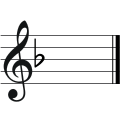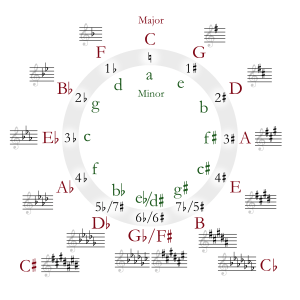F major facts for kids
 |
||
| Relative key | D minor | |
|---|---|---|
| Parallel key | F minor | |
| Notes in this scale | ||
| F, G, A, B♭, C, D, E, F | ||
F major is a special group of musical notes. It's like a musical alphabet that starts on the note F. When you play these notes in order, it creates a sound that many people find bright and cheerful.
Every musical key has a "key signature." This is a set of sharps or flats at the beginning of a piece of music. F major has one flat, which is on the note B. This means that every time you see a B in a piece of music written in F major, you play a B-flat instead of a regular B.
F major also has a "relative minor" key, which is D minor. Relative keys share the same key signature. It also has a "parallel minor" key, which is F minor. Parallel keys start on the same note but have different key signatures and moods.
Contents
Instruments that Love F Major
Some musical instruments are naturally "at home" in F major. This means they sound their best and are easiest to play in this key. These instruments include the English horn, the basset horn, the horn in F, the trumpet in F, and the bass Wagner tuba.
When composers write music for these instruments, they often write it in a different key, like C major. This is because the instruments themselves change the sound. For example, a horn in F will sound a perfect fifth (like five notes up or down) lower than what is written on the page. This is a bit like a secret code between the composer and the musician!
For instance, the trumpet in F sounds a perfect fourth (like four notes up or down) higher than what is written. The basset horn can sometimes sound an octave (eight notes) and a fifth lower. This is why composers need to know these special rules to make sure the music sounds exactly right.
Why Composers Use F Major
Composers often choose F major for specific reasons. For example, Francesco Maria Veracini, a composer from a long time ago, wrote many of his Overtures in F major or B-flat major. He did this for Prince Friedrich Augustus in Dresden.
The prince's orchestra had many wind instruments. These instruments played really well in F major and B-flat major. So, choosing these keys helped the orchestra sound its best and made the music easier for the musicians to play.
Famous Music in F Major
Many famous composers have written beautiful pieces in F major. Here are a few examples:
- Brandenburg Concertos Nos 1 & 2 by Johann Sebastian Bach
- Piano Concerto No. 19 by Wolfgang Amadeus Mozart
- Symphony No. 6 in F Major, Op. 68, "Pastoral" by Ludwig van Beethoven
- Symphony No. 3 in F Major, Op. 90 by Johannes Brahms
- Piano Concerto No. 2 (Shostakovich) by Dimitri Shostakovich
- Concerto No. 3 in F major, Op. 8, RV 293, "L'autunno" (Autumn) by Antonio Vivaldi
Exploring Music Keys
| Diatonic Scales and Keys | |||||||||||||||||||||||||||||||||||||||||||||||||||||||
|---|---|---|---|---|---|---|---|---|---|---|---|---|---|---|---|---|---|---|---|---|---|---|---|---|---|---|---|---|---|---|---|---|---|---|---|---|---|---|---|---|---|---|---|---|---|---|---|---|---|---|---|---|---|---|---|
|
|||||||||||||||||||||||||||||||||||||||||||||||||||||||
| The table shows the number of sharps or flats in each scale. Minor scales are written in lower case. | |||||||||||||||||||||||||||||||||||||||||||||||||||||||
See also
 In Spanish: Fa mayor para niños
In Spanish: Fa mayor para niños


